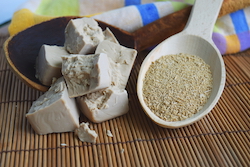Yeast study links sugar to growth of cancer cells
Yeasts are a diverse group of unicellular organisms representing great untapped potential for developments in both the food and healthcare sector. There are more than 1 500 biodiverse species of yeast in existence, of which Saccharomyces cerevisiae – better known as baker’s yeast – has been commonly known for centuries for its use in brewing, baking and, more recently, drugs such as insulin. Other varieties remain poorly studied, though considerable work is under way to explore their vast potential. One recent study has now shed new light on the relationship between sugars and the growth of cancerous tumours, using yeast as a model organism. EU support in the form of a Marie Curie fellowship for the PI SIGNALLING project fed into this research, the results of which have been published in the journal ‘Nature Communications’. In the absence of oxygen, cells process sugar by glycolysis, a less efficient method than respiration. This is the process that causes muscles to burn during strenuous exercise, and produces ethanol during the brewing of beer. Where both yeast and cancer cells differ from other cells is that they process sugar using this method by preference, in a phenomenon known as the Warburg effect, after the German Nobel laureate Otto Heinrich Warburg. Proteins activated by sugar The results of this new study suggest there is, ‘an evolutionary conserved mechanism linking fermentation to activation of Ras, a major regulator of cell proliferation in yeast and mammalian cells, and prime proto-oncogene product’. Ras proteins act as switches on intracellular signalling networks, controlling processes such as cell proliferation, apoptosis and cell migration. Mutations in these proteins have been linked to cancer, contributing to cancer cells’ ability to grow unchecked. The researchers’ study shows that Ras can be activated by sugar. This class of protein is also present in yeast, making it an ideal model organism to study its influence on cancer cells. The researchers examined Ras activation in vivo, with glucose added to galactose-grown cells, and in situ, with glycolytic intermediates. The aim was to identify the molecular connection between glucose fermentation and activation of Ras. Their findings suggest that the Warburg effect creates a vicious cycle through activation of Ras, causing enhanced fermentation rate to stimulate oncogenic potency. The research team stress that the findings do not show that sugar causes cancer, rather that they demonstrate how sugar is broken down differently in cancer cells. PI SIGNALLING (Phosphate sensing for activation of the protein kinase A pathway in yeast) has looked at Saccharomyces cerevisiae as a model system for eukaryotic cell research because of its genetic tractability and powerful genomic approaches. Lead author of the study, Johan Thevalain, explains that the biochemical connection between nutrient availability in the form of glucose, nitrogen, phosphate, sulfate and others, and the control of the PKA pathway has been a central theme of the team’s research for the last 30 years. Its importance also lies in the fact that the PKA signalling pathway controls fermentation rates, stress tolerance and many other properties of yeast cells. These properties are of crucial importance in industrial applications involving yeast, such as the production of fermented drinks, bioethanol and bio-based compounds. For more information please see: PI SIGNALLING CORDIS project page
Countries
Belgium



